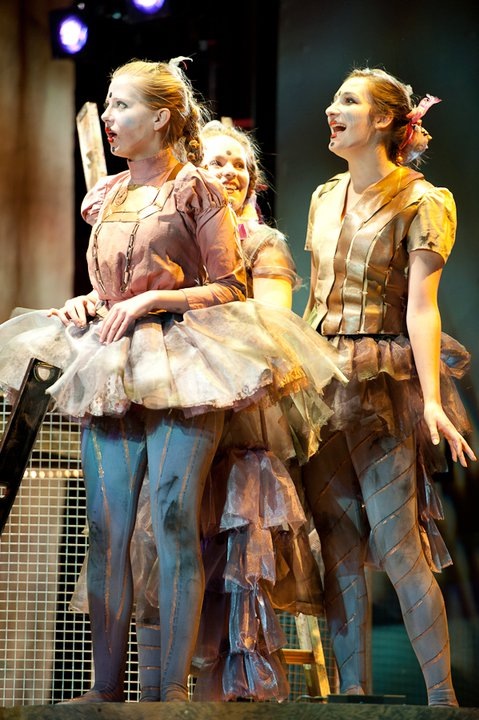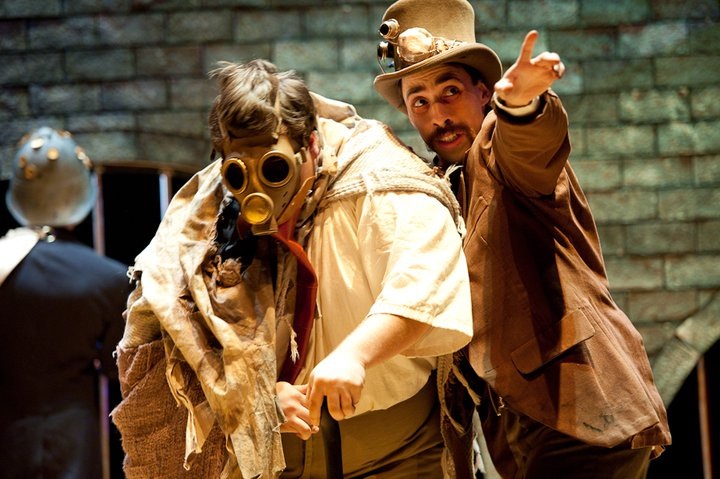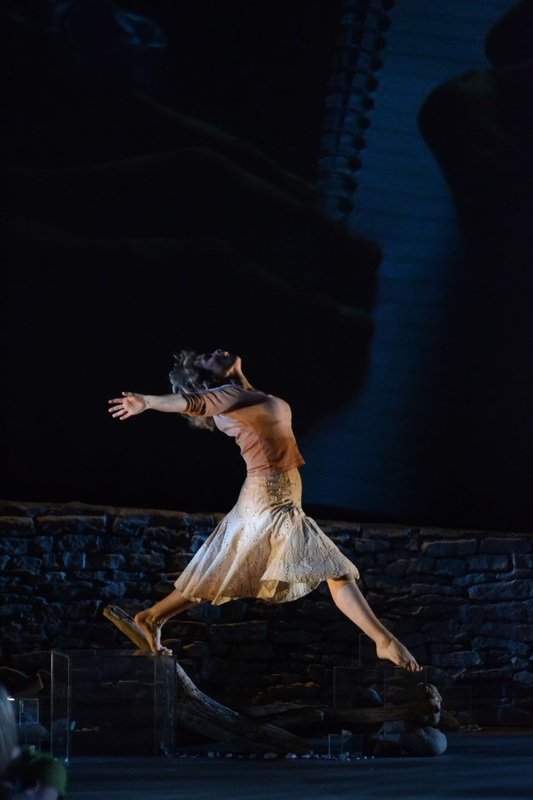|
Jacqueline Lawton: How long have you lived and worked as a playwright in DC? What brought you here? Why have you stayed?
Heather McDonald: I moved to D.C. in the late 80s after grad school in New York, traveling for a year through Europe, the Middle East and Africa, a rather young marriage to someone fiercely interested in politics and journalism, and this growing feeling that I just couldn't "be" a writer in New York. It was too damn stimulating, too many of my friends were dying or sick, and I longed for a life that would eventually have room for children, a house, a garden. Washington turned out to be a great creative move for me. In the early 90s I began a long relationship with TFA (Theater of the First Amendment) nurtured by Rick Davis. Not only did TFA produce my work, they gave me incredible opportunities to develop as a director. JL: Have you ever been a member of a DC area playwrights writing group? If so, did you find it useful? Would you recommend that other playwrights join them? HD: Not officially, but my first job here was with Living Stage at Arena as Bob Alexander's assistant. Jennifer Nelson was one of the marvelous actors. Through a series of synchronicities, I ended up with a commission at Arena Stage (during the times when there was a company and a whole helluva lot more money for such things) and a residency that allowed me to write a big-cast play, "The Rivers and Ravines." It was a chance to create on a large canvas. Oddly, that remains my most produced play. 26 actors, but every community theatre and college theatre department wants that. I've had close to 400 productions and I'm something of a goddess in Texas it's been done there so many times. JL: In DC, we have the Capital Fringe Festival, the Source Theatre Festival, the Kennedy Center's Page-to-Stage Festival, the Black Theater Festival, and the Hip Hop Theatre Festival. We also have the Mead Lab at Flashpoint Theater Lab Program. Have you participated in any of these? If so, can you speak about your experience? HD: Joy Zinoman directed a short piece of mine for the Source Theatre Festival when Jeremy Skidmore jumpstarted that whole shebang. JL: What kind of work do you do to pay the bills? How do you balance this work with your writing? HD: I am full time position as a Professor at George Mason University (GMU). Also, I direct, write in other mediums, like opera libretto and have done film and TV work and I do other kinds of workshops around the country. It's a cobbled-together sort of living. JL: How many plays have you had produced in the DC area? Were any of these plays self-produced? If so, where and what did you learn from that experience? HD: As far as theatres in the area, I've worked as a playwright and director at a number of them. Signature, Round House, TFA, Source, Center Stage, Arena and when the Playwriting Intensives were happening at The Kennedy Center, Gregg Henry invited me to that party every summer. Never cracked Studio and almost with Woolly, which leads me to the other theme in my life as a playwright in D.C. I was all set to direct Howard Shalwitz in "The Gigli Concert" at Woolly when my younger daughter, Marilyn Grace, became very ill. I withdrew from all work for about a year to care for her, and I have never been so scared of anything as I was when Marilyn was sick and held on through that year. When I resurfaced, my life was in a bit of a shambles. I couldn't write, my own immune system was a wreck, I had massive medical bills, my marriage had come apart, and I just didn't "feel" like a writer anymore. That began a decade of many selves and writer was just one of them. A long, expensive, violent divorce and two small children to care for shifted my priorities. Stability and earning a steady living with benefits became my focus. I moved out of Arlington and lived for 7 years in Catonsville, MD. Once again, that white knight, Rick Davis, played a significant role. When I began working with TFA, I also began teaching at GMU part-time and maintained that relationship. The realization that, as a single parent, I needed to earn a decent living this year and next and the one after that changed my life. JL: If you could be produced at any theatre in DC, which would it be and why? HD: If I had my druthers, hmmm ... I'd finish my long overdue commission for Signature, Howard would ask me to direct something at Woolly, somebody in town would commission me to write my musical about painter Artemisia Gentileschi and pair me with a composer, and I'd purchase a fabulous new dress to have dinner with this fierce group of women known as D.C. Women Playwrights. JL: DC audiences are ... HD: ... so smart. The conversations that happen in and around plays I've had produced are some of the most insightful and thought-provoking ones I've experienced. But, like the critical world, I think the audiences are a bit conservative when it comes to form. Traditional linear plays. It's a tough town for interdisciplinary, devised/built, collaborative kinds of work. The reception, I mean. But I think that is most places dominated by a regional/subscription model of making theatre. JL: DC actors, designers and directors are ... HD: Through a production of my own play "Dream of a Common Language," a whole slew of marvelous artists came into my life. Naomi Jacobson, Jane Beard, Marty Lodge, Jim Kronzer ... and later Nancy Robinette, Michael Willis, John Lescault, Jimmy Whalen ... All of these people I worked with many times. Naomi the most. She is like a muse for me. If I were an actor, I imagine (hope) I'd be Naomi. She has performed in 4 of my own plays and, I believe, I've directed her 6 times. She's my perfect actor. JL: DC critics are ... HD: I stopped reading all reviews a long time ago. When a play of mine was referred to as the "nadir" of the festival at Humana and another was described as "murkily symbolic," I stopped. I was haunted by those phrases and crippled by the fear that I would maybe one day write again something that was "murkily symbolic." Whatever the hell that was! I also don't want to have someone else define my experience. I get someone to tell me the gist of the review and you can sure tell when it's bad when you come to the theatre the next day, and fourteen people put their hand on yours and look at you with concerned eyes and say, "Are you okay?" I didn't make this up, but my favorite saying about the relationship of critic to artist is: How do you feel about critics? The way a fire hydrant feels about dogs. Or less smartass, Cervantes: The dogs bark but the caravan passes by. JL: How do you feel the DC theatre community has addressed the issues of race and gender parity? How has this particular issue impacted you and your ability to get your work produced on the main stages? HD: As far as being a woman, that's annoying too. My play "Dream of a Common Language" is all about that. What it feels like not to be at the table or to be told that your way of seeing the world or telling a story or experiencing life is somehow wrong. It's frustrating to be in 2012 and still so few women who are playwrights and directors are actually working. And I have complicated feelings about the term "woman writer." It takes me back to college when I took courses in "American Literature" or "British Literature" and back in the day there was not a single book by a writer who was female on either of those lists. The message that sent me was that, yeah, you could be a writer, but not a REAL heavy duty writer. JL: What advice do you have for an up and coming DC based playwright or a playwright who has just moved to D.C.? HD: My advice would be to do lots of things and use those skills in storytelling in a range of ways. I've ended up supporting myself financially and creatively as a playwright but also as a director, adaptor, librettist, teacher, coach, mentor and writing in other mediums like film, television and opera. JL: What's next for you as a playwright? Where can we keep up with your work? HD: I committed to that work and all that came with a full time position as a Professor at GMU. I still feel I am all those roles - mother, teacher, writer, mentor, director, professor, artist. My youngest daughter is a senior in highschool, and I find myself dreaming of an earlier self and aching for that "life in the studio" an artist needs.
0 Comments
Your comment will be posted after it is approved.
Leave a Reply. |
My BlogI'm a playwright, dramaturg, and teaching artist. It is here where you'll find my queries and musings on life, theater and the world. My posts advocate for diversity, inclusion, and equity in the American Theatre and updates on my own work. Please enjoy!
Categories
All
Archives
June 2020
Reading List
|



